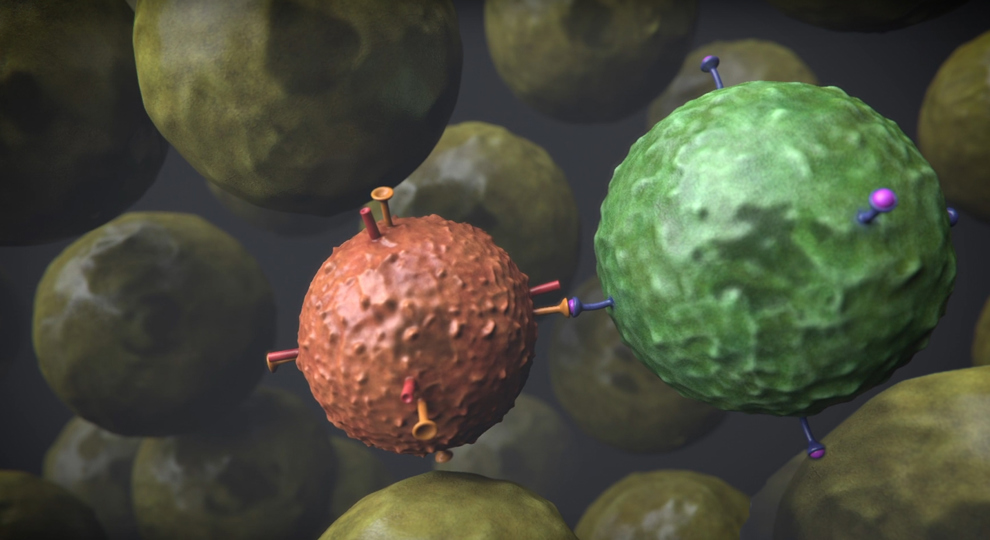The TIL trial
New treatment for patients with metastatic melanoma.
What is the TIL trial?
TIL therapy is a form of cellular immunotherapy: a treatment aimed to strengthen the patient's own immune response. The TIL trial (phase III study) investigates this new treatment type for patients with advanced/metastatic skin cancer (melanoma). The trial compares the experimental treatment with the body's own immune cells (lymphocytes), the Tumor-Infiltrating Lymphocytes (TILs), to an existing and approved form of immunotherapy that has been available in the Netherlands since 2011: ipilimumab (Yervoy®). The TIL trial has been running at the Netherlands Cancer Institute since 2014. We have now been able to include enough patients, and the study results are being analyzed. In the meantime, TIL treatment remains available for patients with advanced/metastatic melanoma.
→ TIL trial for patients with metastatic melanoma
→ TIL therapy is covered by basic health insurance in the context of this trial
→ Always discuss your decision to participate in a trial with your practicing physician.

TIL Therapy - how does it work?
What is the TIL trial?
Who can participate?
Patients with advanced/metastatic melanoma can participate in this study as long as they have multiple metastases – with one being at least two to three centimeters in diameter – that are eligible for surgical removal. We use this tumor tissue to grow immune cells (TIL). Patients furthermore cannot have been treated with ipilimumab in the past, and cannot have undergone more than one systemic anti-melanoma treatment. Finally, patients must be in adequate general physical condition.
If you are not sure whether you qualify for this study, please feel free to contact us.
What are the expected results?
Small studies (phase I/II studies) both nationally and internationally show that TIL therapy is successful in about 40-50% of patients, with complete remission in about 10% of patients. For these patients, the subsequent prognosis for these patients can be very good. The published results of the phase I/II studies can be found in the following scientific articles:
Ipilimumab has been available in the Netherlands since 2011. Large studies indicate that about 10-15% of patients show a good, long-term response to this drug.
The published results can be found in the following scientific articles:
Treatments
TIL treatment
TIL treatments consist of several steps
- Screening investigations (to assess the eligibility of the patient to participate in the study)
- Surgical resection of a tumor lesion (metastasis) (used for TIL outgrowth)
- Admission (±3weeks) for:
- Preparative chemotherapy (7 days) to make space for the infused TILs)
- TIL infusion (via intravenous infusion)
- Treatment with the growth factor IL-2 (up to 5 times, to promote TIL survival and outgrowth after infusion)
- Follow-up
Growing TILs (the immune cells that will fortify the immune system)
Growing the TILs is a very precise process, which takes place in a specialized laboratory of the pharmacy's BioTherapeutics Unit or Sanquin. The resected tumor tissue is directly brought to this facility from the operation room. The cells will be isolated from the tissue and prepared to grow into billions of T cells over the course of approximately 5 weeks. These large numbers will be returned to the patient via a single infusion.
This video briefly illustrates the process:
Information flyer
FAQ
Is TIL therapy available in multiple Dutch hospitals?
No, TIL therapy is currently only available at the Netherlands Cancer Institute because of the specific equipment and expertise that the treatment requires. At the Netherlands Cancer Institute we have had a dedicated laboratory and a specialized team producing the TILs since 2010. Since 2014 this team was further reinforced by a team from Sanquin Amsterdam West, trained and certified in TIL production.
Is the treatment covered by health insurance?
Yes, TIL therapy will be covered by basic health insurance for the duration of this trial (eight years). This therapy is only provided and reimbursed in the context of this trial. Ipilimumab is the standard treatment, which is covered by basic health insurance.
Is it safe to participate in this trial?
Yes, but both treatments may cause side effects. Ipilimumab may cause inflammation, such as intestinal infections (diarrhea) or inflammation of other organs. TIL therapy consists of several steps, each of which can cause different side effects. The chemotherapy delivered before the TILs are returned may cause nausea, decreased resistance, or hair loss. You may experience some shakiness or shortness of breath during or immediately after TIL infusion. The final step, treatment with growth factor IL-2, may cause similar side effects, as well as diarrhea, fever, skin reactions, nausea, or impaired kidney function. Most side effects have been found to be reversible (they are temporary and will go away).
If I want to stop participating in the trial, can I?
Yes, you can. This is your right. You can stop participating in the trial at any point.
Do you have sufficient experience with this new treatment type (TIL)?
TIL therapy is, of course, a new treatment that is still being researched. However, we have treated more than 600 melanoma patients worldwide with TIL therapy to date. The treatment has been available at the Netherlands Cancer Institute since 2011, which has allowed our team to gain experience with the growth of TILs and the various side effects that can occur after TIL return and IL-2 growth factor treatment.
Extra information
Find extra information about TIL and the team coordinating this trial below. All videos are available in Dutch only.
Patient experience
Explanation of cell growth
Successes of TIL therapy
Downsides of TIL therapy
The future of TIL
More information
For more information about the trial, please consult your practicing physician.
Trial coordination
The TIL trial is coordinated by the following team:
 nl
nl
 Nederlands
Nederlands